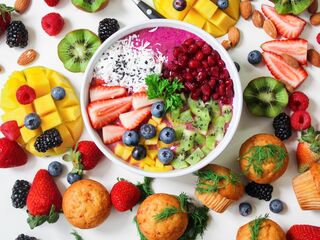Stress
What to Eat When You Have Cancer
Your body needs anti-inflammatory foods and drinks to combat the inflammation.
Posted December 2, 2021 Reviewed by Lybi Ma
Key points
- Body, mind, and spirit are all involved in healing. And in eating.
- Nutritious proteins serve your body better than heavily processed foods.
- Eating with other people has emotional and spiritual power that can help you heal.
- A high calorie diet can help combat the loss of muscle tissue and strength that can happen with cancer.

“Eat whatever you want.”
“Eliminate sugar.”
“Eat clean and detoxify.”
“Keto cures!”
As soon as we’re diagnosed with cancer, we’re constantly bombarded by messages about how to eat. From the grocery store checkout line to ads and recipes online, everyone seems to have an idea of what’s best for us.
You know what you eat is important, but what’s important if you want to slow the growth of cancer cells, boost your energy, get through chemo, or recover from surgery? And what if all you want to do is curl up under a blanket and eat for comfort? Is that so bad?
Body, mind, and spirit eating
We’re here to give you a message you won’t hear everywhere else. The message of integrative health is that the whole person, the whole you, matters. Body, mind, and spirit are all involved in healing. And in eating.
What to eat when you have cancer becomes more complex and simpler at the same time. More complex because there is no single, easy answer. Simpler if you remember to nurture the whole you.
Your body
Your body needs energy. It also needs anti-inflammatory foods and drinks to combat the inflammation and cellular distress happening with the growth of cancer cells and the action of treatment.
If you are losing weight without trying, your doctor or other health-care provider may tell you to eat whatever you feel like eating. Their goal is to keep calories flowing into your system to help combat the loss of muscle tissue and strength that can happen with cancer. But nutritious proteins serve your body better than heavily processed foods or fast food.
Your mind
Your mind likely needs calm and clarity. When you’re dealing with a cancer diagnosis, focus can be difficult or impossible. Anti-inflammatory foods and drinks help here, too. Massive doses of caffeine and sugar won’t help you sleep or relax, and they will lead to energy crashes. They jack your body up and let it drop. When your body and mind are busy dealing with cancer, it’s best to minimize stress. Consider an alternative to coffee such as matcha, which is calming and has anti-cancer effects.
Your spirit
Pushing yourself to eat perfectly—no processed food, no junk food, only the highest quality proteins—may or may not help you here. You may already be wondering, “Did I give myself cancer? Is this my fault?” Holding yourself to a higher nutrition standard than ever before can create stress, or even guilt if you eat a fish sandwich from your favorite drive-through instead of grilled fish from the specialty market. Perfection is the enemy of good, and in cancer, there is no perfection, only good.
Eating with other people has emotional and spiritual power, too, so preparing or bringing home foods your family enjoys will help support everyone during the cancer journey.


